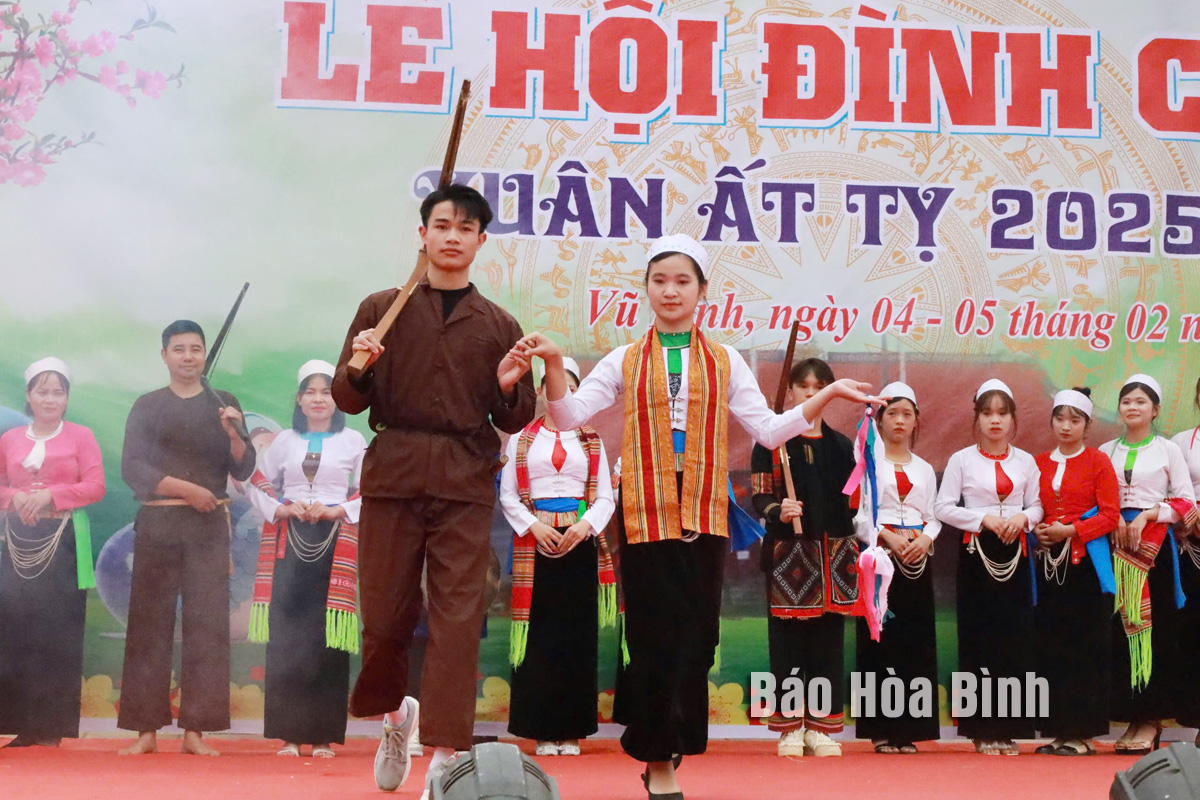
Held biennially on the seventh and eighth days of the Lunar New Year, the Coi communal house festival in Vu Binh commune, Lac Son district, honours Hoang Ba Quoc Mau, her sons - King Cun and King Hai - along with local deities who contributed to agricultural and social development. Beyond its spiritual significance, the festival offers visitors an immersive experience of Muong ethnic culture.

A showcase of traditional Muong attire at the Dinh Coi Festival aims to introduce and promote Muong cultural identity to visitors.
Muong
folk singing, particularly thuong rang bo meng and hat dup giao duyen, is a
festival highlight, attracting large crowds. Renowned Muong folk artist Bui Van
Chinh expressed pride in preserving and showcasing this cultural heritage,
noting the growing enthusiasm of both locals and tourists.
Festival-goers
also witness agricultural rituals accompanied by sacred Cheo Dinh dances and
resonant gong beats. Considered an auspicious start to the farming season, the
ceremonies reflect hopes for favorable weather, bountiful harvests, and
national prosperity. The event also fosters community spirit and cultural
appreciation.
Following
the rituals, vibrant folk performances and traditional games bring the festival
to life. First-time visitor Le Diem Thao from Hanoi praised the well-organised
festivities, particularly the interactive folk games such as nem con (throwing
cloth balls), di ca kheo (stilt walking), and danh mang (bamboo percussion).
Ethnic sports like stick pushing and tug-of-war, alongside modern activities
like volleyball, further energised the celebrations.
The
2025 festival saw an expanded programme, including a Muong ethnic costume
contest with 40 participants and a gong performance competition among hamlet
teams.
Deputy
Chairman of the commune People's Committee Bui Minh Tang emphasised that the
festival, blending tradition with modern cultural exchanges, has become a key
spiritual tourism event.
Thousands
of visitors attended, engaging in cultural experiences, exploring local
customs, and enjoying OCOP-certified specialties. The event not only promotes
cultural preservation but also stimulates tourism and economic growth in the
region.
The clothing of women reflects the culture of the Muong, Thai, Tay, Dao, and Mong ethnic groups in the northern province of Hoa Binh.
Gongs hold a special place in the cultural and spiritual life of the Muong ethnic people in Hoa Binh province. More than musical instruments, they are an indispensable part of community rituals and collective memory, echoing through generations as a spiritual thread linking the past, present, and future.
Preserving and promoting the cultural values of the Muong ethnic group has become an urgent task in the current context, as many traditional values face the risk of fading away. This effort requires not only protecting the cultural identity but also eliminating outdated customs and developing a modern cultural lifestyle, contributing to sustainable values for the Muong community in Hoa Binh province.
The Muong ethnic culture, deeply rooted in Vietnam’s mountainous north, continues to be preserved and revitalised by dedicated individuals and communities determined to safeguard their ancestral identity.
The Muong group is one of the largest ethnic minorities in Vietnam, primarily found in Hoa Binh province. The Muong people in Hoa Binh boast a rich and diverse cultural treasure that reflects the unique identity of this ethnic group. Accounting for over 63% of the province's population, they have created and preserved numerous distinctive cultural values, contributing to their unique identity. Their cultural heritage is an invaluable asset, at the heart of their national identity, and represents a vibrant spiritual life that must be preserved and promoted in today’s modern world.
For generations, the ethnic communities of Hoa Binh province, particularly the Muong people, have preserved vibrant festivals deeply intertwined with the region’s geography, nature, and social traditions. These celebrations enrich Hoa Binh’s spiritual life and cultural identity, reflecting both folk beliefs and the intermingling of ethnic customs. Many of these festivals have endured the test of time, passed down through generations and continuing to thrive today. Among them, the Khai Ha (Going Down to the Field) festival stands out as one of the most significant events of the Muong ethnic group.



